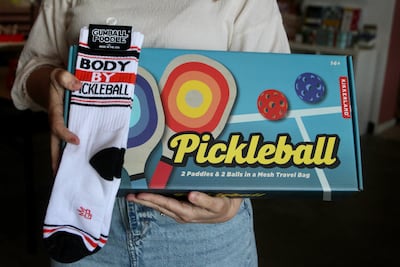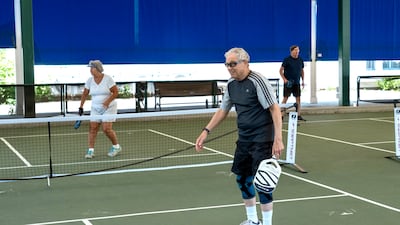A distinctive dull thwack reverberates around the pickleball courts in Kennebunk, in the north-eastern state of Maine.
About a dozen people are at the enclosed public space playing America's fastest-growing sport that has its sights set on global expansion and even the Olympic Games.
“I just thought it would be a fun something to do as I'm older and I can't play tennis any more,” Bob Simmons, a whippet-thin, athletic-looking 76-year-old, tells The National.
“It's a great group of people. It's a nice social activity. It's been a lot of fun.”
Courts have sprung up across the US and beyond. In April, Pickleball Kingdom, the largest provider of indoor pickleball courts, signed a deal with Franchise India Group to bring its brand to India and the UAE.
Courts will initially open in Dubai and Abu Dhabi, with the rest of the UAE to follow.
Rob Street, Pickleball Kingdom's chief operating officer, is bullish about the sport's progress in the region.
“We have been very methodical and intentional with our growth. This is just phase one of our expansion plan,” he said in a statement.
Fans of the sport, which dates back six decades, now want it to be included in the Olympics.
But to pass muster it has to pass an array of hurdles. For a start, it must be played in 75 countries on four continents. At the last count, it has reached 40, including the UAE.
Then, there has to be an international federation and it has to implement the World Anti-Doping Code.
The smart money is on pickleball being included in the 2032 Olympics in Brisbane.
Born out of necessity
Pickleball's spread is impressive for a game that started in the back garden of Joel Pritchard, a Republican congressman from Washington state, in 1965.
He and his friends had planned to play badminton on the court at his home. But to Mr Pritchard's annoyance, they did not have enough racquets for a game.
So they improvised, grabbing a couple of table tennis bats and a perforated plastic ball.
Initially, the net was about 1.5 metres high, but that was soon lowered to about 0.9 metres.

Mr Pritchard, businessman Bill Bell and a third friend, Barney McCallum, devised some rules, largely based on badminton – and the rest is history.
Simply put, the game looks a bit like tennis, albeit with outsize paddles rather than racquets, and is normally played with two players on each side.
However, only the server can score points with the serve changing sides if he or she commits a fault.
Normally the first team to hit 11 points wins, providing it is two points ahead.
The growth of the sport has been astonishing, with an estimated 36.5 million players in the US, representing a 223.5 per cent growth over the past three years, according to Pickleball Kingdom.
The sport is often stereotyped as a game predominantly played by older people, but actually those aged 18 to 34 are the largest group, representing 28.8 per cent of the total. Those over 55 account for just under 20 per cent.
The latter cohort was heavily represented in Kennebunk when The National went to observe a few games.
John DeRoche, 68, has been playing the sport for five years.
“It's inexpensive and it's easy. It's $3 an hour here. The game is quick and good socially. It's competitive. When I have played a game, I have done more than 4,000 steps, that's more than two miles,” Mr DeRoche said.
“It's available all over the place. It's not just a game for old white people. We have a guy called Teddy who is at college. He is very good.”
Chris Baker, 62, finds the sport an ideal way of keeping fit.
“I have been playing for a year. It's exercise and it's social. Is it competitive? That depends, it is more competitive at night than during the day.
“For some people, it's 80 per cent competitive, 20 per cent social; for some, it's the other way around and for some folk, it's 50-50.”
So many pickleball courts are popping up around the country that they're taking over empty stores and malls, and US media have run a spate of stories of residents in some communities complaining of the non-stop, clack-clack sound of players hitting plastic pickleballs.

